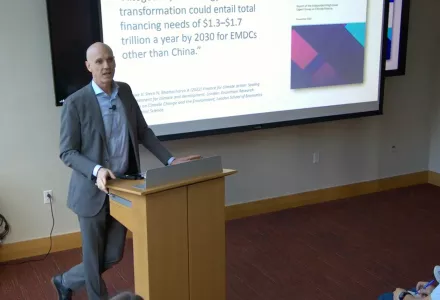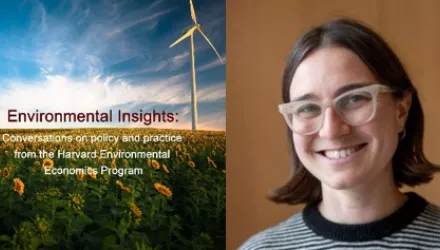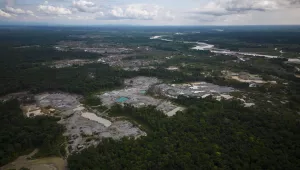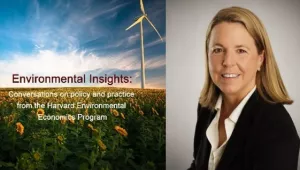
Key Takeaways
- The transition to a low-emissions future is happening now.
- This transition is not just about climate mitigation—it is a low-carbon economic transition, which will require solutions from not only environmental policy, but also trade policy, labor policy, industrial policy, fiscal policy, local economic development, and more.
- Conventional economic thinking, which typically views reducing emissions as costly and value-destroying relative to the current market equilibrium, needs to evolve along with the evolving context around climate action.
“The transition to a low-emissions future is happening now,” said Dr. Leon Clarke, Director of Decarbonization Pathways at the Bezos Earth Fund, speaking to a packed room at the Harvard Kennedy School of Government during a November 25 Energy Policy Seminar. Driven by technological advances, the journey to net-zero carbon emissions is “a question of when, not if,” according to Clarke.
Cost reductions in low-carbon energy technologies are driving the next major energy system transformation. However, uncertainty remains on whether the world is on track to limit global atmospheric warming to less than 1.5 degrees Celsius. While “we’re probably on track for under two degrees of warming,” especially considering the likelihood of additional supportive policies in the future, Clarke admitted that we’re still “somewhere between doing nothing and hitting 1.5 degrees C.”
Clarke attributes this uncertainty and slower pace of action to the challenges associated with making “rapid economic transitions.” He urged the audience to “not just think of the energy transition in terms of climate change mitigation, think about it as a low-carbon economic transition,” involving not only climate policy, but also trade policy, industrial policy, labor policy, local economic development, and more. The complexity of “moving [entire] economies to clean” requires “building the new” but also “transitioning the old”—the latter being where most of the challenges lie, said Clarke.
Chief among these challenges is a lack of adequate financing. Citing a recent report by Songwe and Stern from the Independent High-Level Expert Group on Climate Finance, Clarke noted that developing countries (excluding China) may need between $1.3 to $1.7 trillion in investment per year by 2030 in order to reach decarbonization goals. Private sector investment also faces hurdles such as currency and political risk, a limited pipeline of bankable projects, lack of capacity among local institutions, and the inability of public and private financial institutions to work together.
Additional challenges include the “skills gap” facing the global clean energy workforce and persistent supply chain issues for critical materials and components. Concerns about “stranded assets” created by a rapid transition raise questions about how to retire assets early while addressing considerations about fairness, economic value, ramifications for the political economy, and more. This is no small feat: the discounted economic impacts of stranded assets, including unburned fossil fuel reserves, could be between $1 to $4 trillion between 2015 and 2050, according to Clarke.
Additionally, many countries rely on fossil fuels for government revenue. In India, for example, 18% of government revenue comes from fossil fuel-related economic activity. Other major fossil economies include Canada, Brazil, Indonesia, and several regions in the United States. “Now you’ve got fiscal issues you’ve got to deal with when coming out of fossil,” said Clarke. These challenges will require responses that draw from labor policy, industrial policy, and trade policy. Economic thinking must evolve to keep pace with the changing context around climate action, said Clarke.
These issues are not traditionally dealt with in environmental economics, which typically focuses on taxes, quotas, or other mechanisms for forcing the economy to internalize the negative externalities from carbon emissions. As a result, conventional economic wisdom has held that reducing emissions is costly by default. However, other perspectives are emerging that challenge the notion that reducing emissions is solely a burden on the global economy. These approaches recognize that other priorities beyond cost affect incentives, such as the need to reduce air pollution for health reasons. Additionally, many economists are also beginning to incorporate the social cost of carbon (for more on this topic, see this summary of a recent Energy Policy Seminar on SCC estimates) into their cost analyses, with some projections even predicting an overall reduction in cost associated from reducing carbon emissions.
Many previous estimates have also consistently underestimated the cost reductions in emerging technologies, which have declined more rapidly than expected and driven increased adoption. Clarke noted an emerging understanding among many of the world’s leading companies that adhering to the status quo ante is risky; failing to invest in new solutions may not only lead to increased regulatory scrutiny in the future, but may also cause them to miss out on significant financial opportunities, potentially alienating investors.
Much of this tension is “driven by different basic beliefs about how economies work,” said Clarke. It remains to be seen whether transitioning economies to “clean” will create inefficiencies relative to the current market equilibrium, or whether it can drive more economic activity and growth. Recent developments, such as sweeping environmental policies like the Inflation Reduction Act and increasing private capital investment in clean energy technologies, seem to indicate that the latter perspective may be prevailing in current economic calculus.
Watch the recording of Clarke's talk below.
Floyd, Matt. “Event Debrief: Bezos Earth Fund's Leon Clarke Says Economic Thinking on Climate Action Must Evolve.” Belfer Center for Science and International Affairs, Harvard Kennedy School, December 21, 2023





